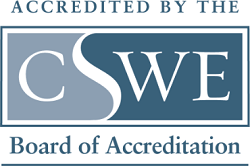Department of Social Work
Educating students for social justice-focused and community-based social work practice.
Welcome
We educate our students to challenge systemic injustice, help those in vulnerable situations, heal trauma, and strive for social change through their practices. The Department is committed to respectful engagement and collaboration with community partners in its scholarship, teaching, and service.
Council on Social Work Education and Accreditation
 This is the sole entity that sets the standards for social work education across the nation. These standards help to increase the quality of practicum and classroom training that later have important impacts in the field. The Educational Policy and Accreditation Standards (EPAS) were developed and are continually revised by The Council on Social Work Education's (CSWE) Commission on Educational Policy (COEP) and the Commission on Accreditation (COA). These policies outline the accreditation process which includes site visits, program benchmarks and assessments.
This is the sole entity that sets the standards for social work education across the nation. These standards help to increase the quality of practicum and classroom training that later have important impacts in the field. The Educational Policy and Accreditation Standards (EPAS) were developed and are continually revised by The Council on Social Work Education's (CSWE) Commission on Educational Policy (COEP) and the Commission on Accreditation (COA). These policies outline the accreditation process which includes site visits, program benchmarks and assessments.
Read our Assessment and Accreditation Reports
Social Justice Statement
We are committed to educating students for social justice-focused social work practice by integrating a social justice lens throughout our undergraduate and graduate programs.
Finding Your Place in Social Work
You may find our social work major after arriving in college. Perhaps you engaged in volunteer service at your high school or through your faith community, where the work to help others is rarely referred to as social work and often does not include a social analysis lens.
Would Social Work Be A Good Fit?
We provide guidance to help you explore social work as a career.
Our Degrees
/207x0:993x786/prod01/channel_34/media/seattle-university/college-of-arts-and-sciences/departments-and-programs/department-of-social-work/images/FirstPlace_yck_SamanthaStork_010.JPG)
Undergraduate
Choose from a BSW, BSW with Departmental Honors or Minor in Social Welfare.
/600x0:3000x2400/prod01/channel_34/media/seattle-university/college-of-arts-and-sciences/departments-and-programs/department-of-social-work/images/SeattleUniversity_SocialWork_-055.jpg)
Graduate
We offer a two-year MSW program and, for those who have earned their BSW, a Advanced Standing program.
/1000x0:5000x4000/prod01/channel_34/media/seattle-university/college-of-arts-and-sciences/departments-and-programs/department-of-social-work/images/Schenker_SU_MSW-053.JPG)
Field Practicum
A critical component of both our undergraduate and graduate programs is the field practicum. Under the supervision of trained Social Work Practicum Instructors, students engage in hands-on learning complemented by integrative seminars with classmates.
/0x28:576x693/prod01/channel_34/media/seattle-university/directory/faculty-amp-staff-directory/images/placeholders/ProfileDefaultPics-Redhawk.png)
/0x28:576x693/prod01/channel_34/media/seattle-university/directory/faculty-amp-staff-directory/images/placeholders/ProfileDefaultPics-SpiritMark.png)
/0x48:989x1189/prod01/channel_34/media/seattle-university/directory/faculty-amp-staff-directory/images/artsci/FarinaAnne-Lg-c8X10.jpg)
/0x28:576x693/prod01/channel_34/media/seattle-university/directory/faculty-amp-staff-directory/images/placeholders/ProfileDefaultPics-Interlock.png)
/0x58:1210x1454/prod01/channel_34/media/seattle-university/directory/faculty-amp-staff-directory/images/artsci/McCain-Anna_LG-c4X5-mw-.jpg)